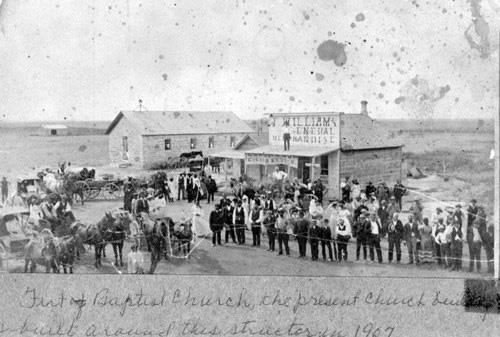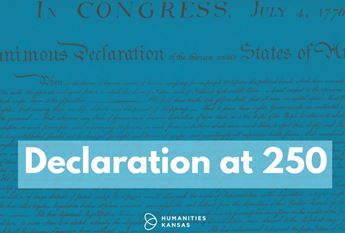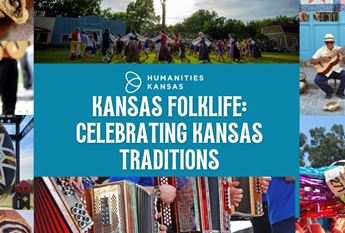

We Heard Freedom
February 21, 2022
“O Nicodemus! Somewhere between myth and magic you stand...
We heard Freedom in your name."
-O Nicodemus!, Sunni Patterson
The story of Nicodemus, in Graham County in northwest Kansas, is one built on faith and conviction. According to Angela Bates, descendant of the original founders, it’s a place where formerly enslaved peoples went “seeking a place to call their own.” The history of Black homesteaders in the Midwest is one that is often excluded when stories about the peopling of the plains are told. That’s about to change. Nicodemus is an “eye-opening story that combines self-determination and self-reliance in a tradition of homesteading and pioneers,” shared filmmaker Dan Manatt. With support from an HK Humanities for All grant, Manatt has created a documentary short film about Nicodemus that will be included in the upcoming PBS documentary. He is working with Bates and the Nicodemus Historical Society to tell the story that he says has all the markings of a great Hollywood movie: Strong people determined to succeed through booms and busts, failed railroads and bankers, natural disasters, national political debates, and the pursuit of freedom. The short film segment on Nicodemus is part of a larger documentary, The African American Midwest: A 400 Year Fight for Freedom, exploring centuries of African American history and features several stories from Kansas, including the 1954 Brown v. Board of Education landmark Supreme Court case in Topeka and Wichita’s 1958 Dockum Drugstore student sit-in.
Watch the Nicodemus segment.
Watch: Black Pioneers and Buffalo Soldiers. (15:26)
America’s story of Black homesteaders is often overshadowed by the stories of Reconstruction, Jim Crow laws, and the Great Migration of the early 1900s. But after the 1862 Homestead Act was passed, many formerly enslaved African Americans sought to improve their lives on farms and in towns they built themselves across the Midwest. The oldest example west of the Mississippi still survives in Nicodemus. The first settlers arrived from Kentucky in 1877 with limited supplies. The land did not have the timber to support building, so the settlers lived in dugouts until an 1880s building boom brought the erection of stone dwellings and businesses. By 1885, nearly 500 people lived in Nicodemus. The town had stores, two newspapers, a school, a livery stable, and churches, surrounded by thousands of acres of homesteads. Unfortunately, a series of external events, including a bypassed railway and economic devastation during the Great Depression of the 1930s, quelled growth in the early 20th century.
Today, fewer than 25 people live in town, but through the efforts of fourth-generation descendant Angela Bates and many others, the important story of Black homesteaders is being shared more broadly to promote understanding of how formerly enslaved peoples persevered and thrived. Bates has long been a driving force of that effort. She explains that for Nicodemus’ settlers in Kansas “homesteading was the draw, and the push was the Jim Crow laws that were being instituted almost immediately after Emancipation. They could govern themselves and participate in homesteading and the agrarian lifestyle.”
The homesteaders’ agrarian legacy is featured in The African American Midwest documentary through the story of the late Bernard Bates, Sr., the last active farmer in Nicodemus, and his relentless fight to combat federal discrimination of Black farmers.
The African American Midwest documentary will share the Nicodemus story with a wider audience, enhancing the history on display at the Nicodemus National Heritage Site. The legacy of Nicodemus lives on during the annual Homecoming celebration which welcomes hundreds of Nicodemus descendants to town for an annual reconnection to the land and stories that are so important. There really is no place like home.
The full documentary, The African Americans Midwest: A 400 Year Fight for Freedom, is expected to air next year on PBS stations.
Humanities for All grants are available for short and full-length films exploring history and culture. Contact Leslie VonHolten, Director of Grants and Outreach, for more information.
Join the Movement of Ideas
- Visit the Voices and Votes: Democracy in America Smithsonian exhibition at the Nicodemus National Historic Site and the companion exhibition Nicodemus Politicians on exhibit July 1 - August 13, 2023.
- Bring Angela Bates’ Speakers Bureau presentation, “Children of the Promised Land,” to your community. Bates’ presentation discusses the dynamics of mothers and their children after slavery, stories of children conceived in slavery but born free, and the contrast of life and decisions based on the simple concept of “choice,” which freedom afforded.
- Listen to Angela Bates discuss the legacy of Nicodemus.
- Watch poet Sunni Patterson read her poem O Nicodemus! beautifully capturing the hopes, fears and faith of the original settlers of Nicodemus.
- Visit Nicodemus. The Nicodemus National Historic Site, and its collection of five key buildings that recount how the residents built a new life of freedom on the Kansas prairie. At Nicodemus Cemetery you’ll find the gravesites of Civil War veterans and formerly enslaved men and women who etched out a living as free Americans. Descendants are partnering with the township and the Nicodemus Historical Society to plot the burials to better manage the cemetery in the future.
- Watch a TikTok video preview of the Nicodemus segment of African Americans & the Midwest: A 400-Year Fight for Freedom.
Image courtesy of kansasmemory.org. Rights and reuse restrictions apply.




